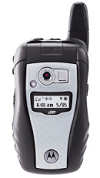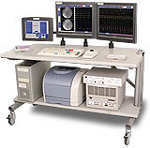 Last month I wrote about the Motorola i580, which Motorola advertises as being built to 810F military specifications. That led me to post this smart-alecky query: if the i580 is built to milspec can I take it with me on international trips?
Last month I wrote about the Motorola i580, which Motorola advertises as being built to 810F military specifications. That led me to post this smart-alecky query: if the i580 is built to milspec can I take it with me on international trips?
Reader Matthew Lancaster did the right thing to answer the question — he went directly to the source. And then he posted in a comment to the original post what he found out:
My policy has always been that when you don’t know the answer, go to the source – the manufacturer. In response to my inquiry, Motorola returned the following:
*****
Dear Matthew,
Thank you for your inquiry regarding obtaining the Export Control Classification Number, Schedule B Code and other related export controls information for the Motorola iDEN i580. We appreciate your interest in our products.
To summarize your conversation with our representative T-, the Motorola i580 is considered a regular transceiver radio/cell phone when traveling outside the US. There are no military spec’s on or in the phone. It does not have be treated any differently than any other cell phones.
We hope that conversation and this response have answered your question regarding obtaining the Export Control Classification Number, Schedule B Code and other related export controls information for the Motorola iDEN i580. Thank you for choosing Motorola.
*****
Not exactly the information I was hoping to receive (an ECCN and Schedule B Code), but close.
Well, that does resolve the question if in fact the phone isn’t built to milspec. But it seems to me that Motorola has leapt out of the DDTC frying pan and into the FTC fire given that Motorola clearly advertises the military specifications of the phone. Here’s a press release that touts that the phone is built to milspec. And then on the web page about the phone, Motorola waxes eloquent about the 810F military specs:
810F Military Specs Built to meet 810F military specifications to withstand the toughest days in the roughest places.
. . .
Meets Tough US Military Specifications.
And the television commercial for the phone mentions the milspec business. I mean they are practically bundling the phone with a tour of duty in Basra. And I’m sure that’s where the Motorola advertising department will want to send the CSR who gave the reply to Matthew, at least if they ever find out about it.
(By the way, the real answer to the question about the phone isn’t to plead false advertising. The best answer, in my view, is that there is a theoretical distinction between building something to milspec and something that is “specifically designed, modified or configured for military application.” The latter would be something that you actually sold to the military. Accordingly, as long as Motorola doesn’t sell the i580 to the DoD, you can safely take it with you out of the country.)

 Posted by
Posted by  Category:
Category: 

 On Wednesday the GAO issued a
On Wednesday the GAO issued a  What happens when a rebel group on the OFAC SDN list lays down its arms, renounces terrorism and joins a government friendly to the United States? If you said they would be removed from the list, you would be wrong. If you said it would result in the U.S. requiring U.S. companies to obtain licenses to deal with the government, you might be right.
What happens when a rebel group on the OFAC SDN list lays down its arms, renounces terrorism and joins a government friendly to the United States? If you said they would be removed from the list, you would be wrong. If you said it would result in the U.S. requiring U.S. companies to obtain licenses to deal with the government, you might be right. I admit that this is an inflammatory headline. But the recent
I admit that this is an inflammatory headline. But the recent  Last week Israeli Customs at the port of Ashdoda
Last week Israeli Customs at the port of Ashdoda 

